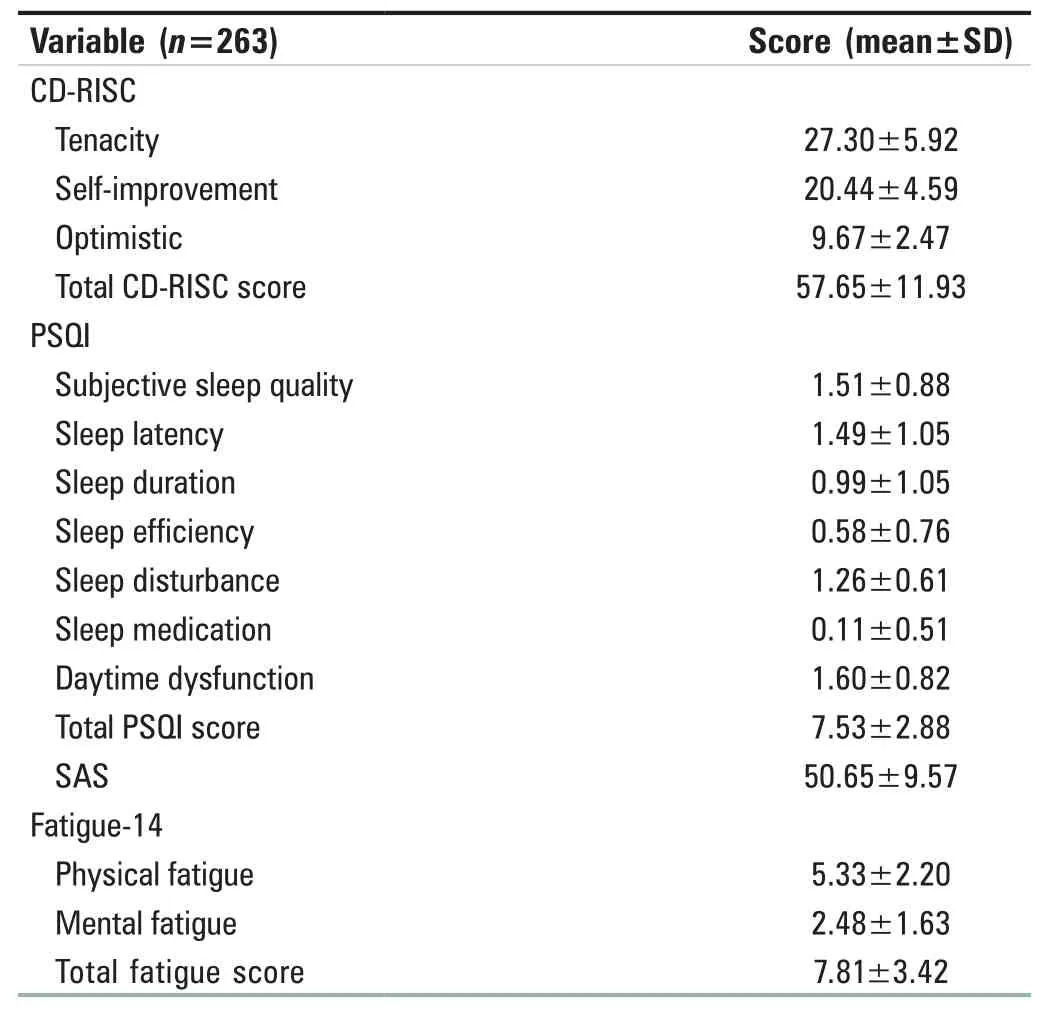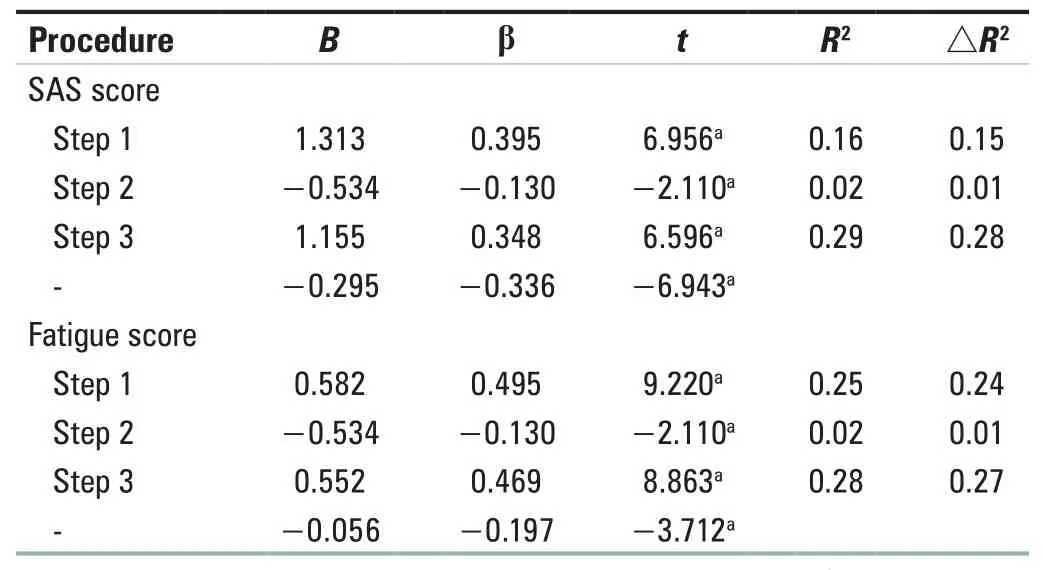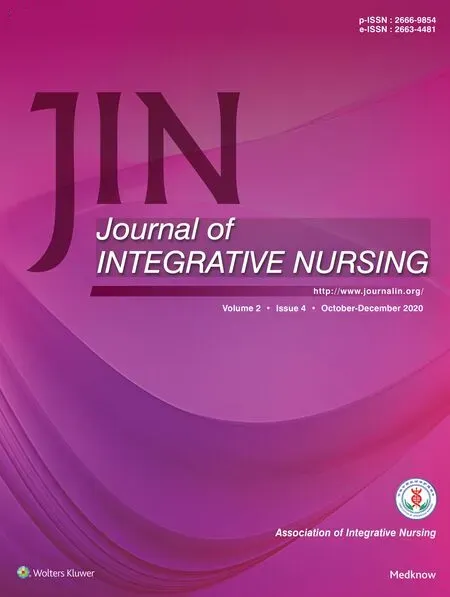The impact of sleep quality on reported anxiety and fatigue among shift nurses: The mediating role of resilience
Xin-Ge WANG, Yan-Yan LUO, Shuan-Rong LIDivision of Endocrinology, Guangdong Provincial People’s Hospital, Guangdong Medicine Institute, Guangzhou, China;School of Nursing, Xinxiang Medical University, Henan, China;Department of Nursing Administration, Henan Provincial Mental Health Center, Henan, China
ABSTRACT
Aims: The aim of this article is to explore the relation of sleep quality, anxiety status, fatigue level and psychological resilience among rotating-shift nurses, thus, to propose solutions and promote physical and psychological health of shift nurses.
Methods: The cross-sectional survey was performed on 263 clinical nurses recruited from three tertiary hospitals of Xinxiang City, Henan Province, China from October 2017 to June 2018. The questionnaire survey was conducted using Pittsburgh Sleep Quality Index (PSQI) for measuring nurses’ sleep quality, connor-davidson resilience scale (CD-RISC) for measuring their psychological resilience, self-rating anxiety scale (SAS) for measuring their anxiety status, and Fatigue-14 Scale for measuring their fatigue. The relationship among above indicators were analysed using Pearson correlation analysis. The mediating effect of psychological resilience on the process of sleep quality impacting anxiety and fatigue was analyzed using Wen’s causual steps method and linear regression.
Results: The mean CD-RISC score of shift nurses was 57.76 ± 11.90, which indicated that resilience level was at a medium level. The mean of PSQI, SAS and total fatigue score was (7.53 ± 2.83), (50.56 ± 9.57) and (7.81 ± 9.42), respectively. Resilience could negatively predict the anxiety state (β = ?0.366, P < 0.01) and fatigue (β = ?0.197, P < 0.01). Sleep quality could positively predict anxiety (β = 0.395, P < 0.01) and fatigue level (β = 0.495, P < 0.01) for shift nurses. The mediating effects of resilience upon sleep quality and anxiety or fatigue was 0.044 and 0.026, respectively.
Conclusion: The resilience could fuel sleep quality and reduce the occurrence of negative emotion and fatigue among shift nurses.
Keywords: Anxiety, fatigue, resilience, rotating shift nurses, sleep quality
INTRODUCTION
Shift work of nurses is a common practice to guarantee medical service continuity and stability, but it interferes with sleep rhythm, causing physical and mental health problems to nurses.[1]Studies demonstrated that there were about 35.5% Chinese nurses troubled with sleep disorders.[2]Moreover,researchers[3]have found that sleep disorders could cause distractibility and emotional problems, thereby affecting work performance and even threatening patient safety. A conducted research[4]revealed that medical errors rate among nurses was approximately 40%, and 78.3% of nurses committed sleepiness as a main cause of medical error in their career.
Resilience is the ability to gradually and successfully recover from stressful events.[5]Due to the particular working mode,mental resilience is a critical resource for nurses to self-adjust and ensure medical safety.[6]Previous studies have indicated that nurses with higher resilience level could significantly experience a lower occurrence of anxiety or depression symptoms, posttraumatic stress disorder and burnout syndrome.[7]Moreover, the overall mental health level of clinical nurses in China is lower than that of the general population.[8]
Anxiety is a common psychological condition and special adaptive protective resource.[9]In China, compared to other medical professions, the prevalence of anxiety symptoms among nurses was moderately high, with a rate of 43.4%.[10]Besides, studies have shown that anxiety level was positively affected by sleep quality,[11]reflecting rotating shift nurses were susceptible population. In addition, shift nurses are also at high risk of fatigue due to high clinical work pressure.Long-term shift may lead to acute fatigue of nurses.[12]Niuet al.[13]have reported that shift nurses are prone to chronic fatigue, which leads to decreased work efficiency and medical errors. Fatigue is also the main reason for the departure of new nurses.
However, there are few studies reported the potential relevance of sleep quality, psychological resilience, anxiety and fatigue. Therefore, we made an analysis of the correlation of the current level of sleep quality, resilience status, anxiety and fatigue of clinical shift nurses.
METHODS
Participants
From October 2017 to June 2018, the participants were recruited by a convenience sample of nurses from three tertiary hospitals in Xinxiang, Henan province, China. The inclusion criteria were: (1) Nurses with working duration ≥3 years, (2)regular APN (A. M, P. M, NIGHT) shift, and (3) nurses who signed informed consent and volunteered to participate.Exclusion criteria were nurses with physical or mental illness,head nurse, other managers, and trainee nurses. A total of 282 participants took part in the study. Among them, 6 declined participation, 12 provided incomplete data, and 1 was diagnosed with depression. Thus, a total of 263 (93.26%)participants completed valid questionnaires.
Procedure
The participants completed a survey questionnaire while attending collective meeting or study. Trained researcher used structured to collect sociodemographic information regarding age, education, occupation, marital status, working duration, wards and current position.
Ethic considerations
Questionnaire was completed under the uniform guidance by the researcher. The questionnaire is anonymous and just used to do this study. Informed consent was obtained from all participants. The study was approved by the Institutional Review Board of Xinxiang Medical University (No.2016000831).
Measures Pittsburgh sleep quality index
The Pittsburgh Sleep Quality Index (PSQI)[14]is a 19-item measure that assesses sleep patterns over the past 1 month, with most variables being assessed on a 0–3 Likert 4 scale (“rarely or none of the time” to “most or all the time”). The PSQI is comprised of seven dimensions:Sleep quality, sleep latency, sleep duration, habitual sleep efficiency, sleep disturbance, use of sleeping medication,and daytime dysfunction. The total PSQI scores range from 0 to 21, higher scores indicate lower level of sleep quality,and the total score >5 indicate poor sleep quality. The PSQI has demonstrated good reliability with a Cronbach’s alpha coefficient of 0.85. In the present study, the Cronbach’s alpha coefficient was 0.69.
The Chinese version of Connor–Davidson resilience scale
The Chinese version of Connor–Davidson Resilience Scale[15]is a 25-item self-report scale for assess level of resilience.This scale comprises 25 items in three dimensions (tenacity,self-improvement and optimism) that assess resilience or capacity to change and cope with adversity. The total score ranges from 0 to 100, and higher scores indicates higher levels of resilience. The Cronbach’s alpha coefficients of resilience and its three dimensions were 0.921, 0.869, 0.833 and 0.597, respectively.
Self-rating anxiety scale
The self-rating anxiety scale (SAS)[16]includes 20 items,among them, there are 15 items are scored in the forward direction while 5 items are calculated in the reverse direction.According to Chinese norm, the critical value of the standard score is 50, 50–59 scores are defined as mild anxiety, 60–69 points belong to moderate anxiety, and ≥70 points belong to severe anxiety. The Cronbach’s alpha coefficient was 0.921.
Fatigue-14 scale
Fatigue scale-14[17]consists of 14 items in two dimensions (physical and mental fatigue). Items 1–8 reflect physical fatigue, while items 9–14 demonstrate mental fatigue. Moreover, items 10, 13 and 14 are scored in reverse.The maximum physical fatigue score is 8 and the sum mental scores is 6, in addition, the total fatigue scores are the sum of scores of the physical fatigue and mental fatigue, with the highest score of 14. The higher the score is, the severer fatigue is. The re-test Cronbach’s alpha of the scale in this study was 0.78.
Statistical analysis
IBM SPSS 22.0 (IBM Corp., Armonk, NY, USA) was used for statistical analysis of the data, measurement data was expressed by mean ± standard deviation, comparison between groups was analyzed usingt-test, analysis of variance, Pearson correlation analysis, stepwise regression analysis,P< 0.05 was considered statistically significant.
RESULTS
Demographic data
Among the surveyed 263 clinical nurses, there were 39 (14.8%) males and 224 (85.2%) females; the average age was 30.19 ± 5.71 years; the average nursing years of working was 7.05 ± 6.80 years; in terms of professional title, there were 82 (31.2%) junior nurses, 148 (56.3%) senior nurses,33 (12.5%) chief nurses, respectively; in terms of education level, there were 141 (53.6%) junior college, 120 (45.6%)bachelor degree, and 2 (0.8%) master degree. For the working department, there were 148 (56.3%) psychiatric nurses and 115 (43.7%) general nurses; as for marital status, there were 142 (54.0%) married nurses and 121 (46.0%) nurses in other circumstances including unmarried, divorced, widowed.Associated nurses aged 25–29 years had the lowest levels of psychological resilience. The status of characteristics of resilience, PSQI, anxiety and fatigue were shown in Table 1:The mean scores of resilience, sleep quality, SAS and fatigue were (57.65 ± 11.93), (7.53 ± 2.88), (50.65 ± 9.57)and (7.81 ± 3.42), respectively. Among three dimensions of resilience, tenacity was the most prominent trait (27.30 ± 5.92),followed by self-improvement (20.44 ± 4.59) and optimism (9.67 ± 2.47).

Table 1: Score of each dimension of Connor-Davidson resilience scale, pittsburgh sleep quality index, self-rating anxiety scale and Fatigue scale-14
Correlation of resilience, sleep quality, anxiety and fatigue
As presented in Table 2, the overall resilience score was negatively correlated with total sleep quality score (r= ?0.158,P< 0.05), and tenacity and self-improvement showed a significantly negatively correlation with subjective sleep quality dimension (r= ?0.150,P< 0.05,r= ?0.152,P< 0.05).Self-improvement dimension was significantly negatively related with sleep disturbance dimension (r= ?0.148,P< 0.05). Furthermore, self-improvement tenacity and optimism were all significantly negatively associated with daytime dysfunction (r= ?0.182,P< 0.01,r= ?0.211,P< 0.01,r= ?0.190,P< 0.01). The tenacity and self-improvement dimensions were significantly negatively related with the total PSQI score (r= ?0.167,P< 0.01,r= ?0.150,P< 0.05).
Furthermore, tenacity, self-improvement and optimism were significantly negatively correlated with SAS score (r= ?0.390,P< 0.01,r= ?0.419,P< 0.01,r= ?0.293,P< 0.01), and sleep disturbance, hypnotic drugs and daytime dysfunction dimension were significantly positively correlated with SAS score (r= 0.366,P< 0.01,r= 0.162,P< 0.01,r= 0.419,P< 0.01). Besides, physical fatigue and mental fatigue dimension were significantly positively correlated with SAS score (r= 0.517,P< 0.01, r = 0.279,P< 0.01) [Table 2].
Physical fatigue were significantly positively correlated with subjective sleep quality (r= 0.475,P< 0.01),sleep disorders (r= 0.461,P< 0.01) and daytime dysfunction dimension (r= 0.524,P< 0.01), and mental fatigue dimension also has a significant positive correlation with subjective sleep quality (r= 0.307,P< 0.01), sleep disorders (r= 0.268,P< 0.01) and daytime dysfunction dimension (r= 0.285,P< 0.01).Besides, physical fatigue has a significant negative association with tenacity (r= ?0.312,P< 0.01),self-improvement (r= ?0.302,P< 0.01) and optimism of resilience (r= ?0.227,P< 0.01) [Table 2].

Table 2: The correlation of resilience between pittsburgh sleep quality index, anxiety and fatigue (r value)
Mediating effect of psychological resilience
The linear regression analysis was used to explore the mediating role of psychological resilience. Direct effects were found between sleep quality and anxiety (β= 0.395,P< 0.01)and between sleep quality and fatigue state (β= 0.495,P< 0.01). Moreover, a direct effect of sleep quality on resilience was observed, revealing that sleep quality was negatively correlated with resilience (β= ?0.130,P< 0.01), while resilience negatively predicted anxiety state (β= ?0.411,P< 0.01) and fatigue (β= ?0.257,P< 0.01). In the last step, after controlling the influence of sleep quality on anxiety, psychological resilience could negatively predict sleep quality. Meanwhile, standardized regression coefficients were reduced fromβ= 0.395 toβ= 0.348 with the inclusion of psychological resilience,which proved that resilience partially mediated the correlation of sleep quality on anxiety or fatigue variable [Table 3].Furthermore, the total effect of sleep quality on anxiety or fatigue was 0.392 and 0.495, respectively, and the mediating effect of psychological resilience on anxiety or fatigue was 0.044 and 0.026, respectively, accounting for 11.22% and 5.25% covariance of the total effect.

Table 3: The meditation of resilience on sleep quality and anxiety, fatigue (β)
DISCUSSION
This study investigated the relationship of resilience, sleep quality, anxiety and fatigue, and explored the moderating role of resilience in the relationship of sleep quality with anxiety and fatigue among rotating shift nurses. The results of this study revealed that the total score of psychological resilience of shift nurses was 57.65 ± 11.93, which was similar to a previous study.[18]Individuals with high resilience could adjust themselves and relieve pressure in an automatic way, however, individuals with low resilience are more prone to suffer anxiety, depression or other symptoms.[19]The results of this study also indicated that the anxiety and fatigue level for nurses in a high psychological resilience were lower than those of the group in a poor resilience,which is consistent with the findings of Bonannoet al.[20]The findings of Friborget al.[21]also demonstrated that compared to nurses in poor psychological resilience, nurses in high psychological resilience perceived less psychological pain or distress, with a higher mental health level. This study provided evidence for this among the shift nurses population.In addition, the results have indicated that the prevalence of anxiety and fatigue status among shift nurses, with a high detection rates of 57.79% and 52.09%, was highly consistent with previous relevant studies on shift nurses .[12,22]The reason accounting for above phenomenons may attribute to high physical and mental demands of nursing work and frequently exposed to unexpected emergency events, which may cause invisible emotional alteration to nurses, including helplessness, frustration, fatigue, etc.[23]
Furthermore, this study illustrated that the sleep quality of shift nurses was in a moderately poor state, with the poor sleep quality detection rate of 61.60%, which was in a significant high level, compared to the research of Liuet al.[24]reporting that the detection rate of poor sleep quality among 1359 Chinese adults was 10.8%. The correlation analysis indicated that psychological resilience was negatively linked to the sleep quality, showing that the stronger resilience shift nurses had, the lower the total PSQI score was, the better the sleep quality was, which was consistent with the research conducted in the elderly population by Liuet al.[25]in 2016.
This study also proved that psychological resilience is positively correlated to the levels of anxiety and fatigue, that is, the stronger resilience shift nurses had, the lower their anxiety and fatigue levels were, which was consistent with the results of Wenet al.,[26]Bookset al.[27]and Minet al.[28]Another finding of the positive relationship between sleep quality and anxiety, fatigue levels, explained that the worse sleep quality shift nurses had, the higher scores of anxiety and fatigue, the higher levels of anxiety and fatigue they had.[29]
After controlling for the influence of demographic variables,hierarchical regression analysis showed that sleep quality could predict anxiety and fatigue level, which is consistent with the results of a previous study that confirmed that sleep quality has a mediating effect on regulating the mental health of young soldiers.[30]Another finding of this study showed that psychological resilience negatively predicted anxiety and fatigue level, which was in accordance with the study of Zenget al.[31]Zenget al. explained that psychological resilience played a partial mediation effect on the relationship of sleep quality predicting anxiety, that is,the high level of psychological resilience could hinder the acting path of sleep quality on nurses’ negative emotions,thus reducing the occurrence of negative emotions and fatigue. A previous report[32]has showed the regulating role of resilience between perceived stress and sleep quality in the community residents, which attached the importance of resilience as a protection resource of sleep quality, which was similar to the results of the present study. Therefore,developing psychological resilience could, on the one hand, improve the ability of shift nurses to cope with work pressure; on the other hand, alleviate the destructive effects of work stress by exploring protective factors, such as altering perception of nurses on work pressure events to motivate them to respond to stressful events in a positive way and maintain strong adaptability in adversity.
CONCLUSION
This study explored the mediating effect of psychological resilience upon sleep quality on anxiety or fatigue states,and established the mechanism of how psychological resilience affecting anxiety and fatigue. As a significantly protective resource, resilience could mediate the correlation between sleep quality upon anxiety or fatigue state. In addition, the results indicated that clinical nurses were in a medium resilience level and abnormal mental state. Thus, nursing managers should take measures to cope with prevalent negative emotions and improve mental health of clinical nurses, thus improving the working satisfaction, reducing the level of mental pressure and job burnout.
Acknowledgments
All members of the research team sincerely appreciate the educational hospital managers and all the nurses participating in this study.
Financial support and sponsorship Nil.
Con flicts of interest
There are no conflicts of interest.
 Journal of Integrative Nursing2020年4期
Journal of Integrative Nursing2020年4期
- Journal of Integrative Nursing的其它文章
- Nursing administration in the geriatric department in the epidemic of COVID-19
- Effect of mild moxibustion in improving the quality of life of patients with diabetic peripheral neuropathy
- An innovative approach of using online problem-based learning and case-based learning in teaching disaster nursing during the COVID-19 pandemic
- Anxiety and perception among nurses toward the outbreak of COVID-19 in University of Uyo Teaching Hospital, Akwa Ibom State
- Assessing the reasons for increase in self-medication and control measures among student nurses in University of Benin Teaching Hospital, Edo State, Nigeria
- Construction of nursing standard of integrated traditional Chinese and Western medicine for patients with COVID-19 (mild and common) in Beijing based on Delphi method
